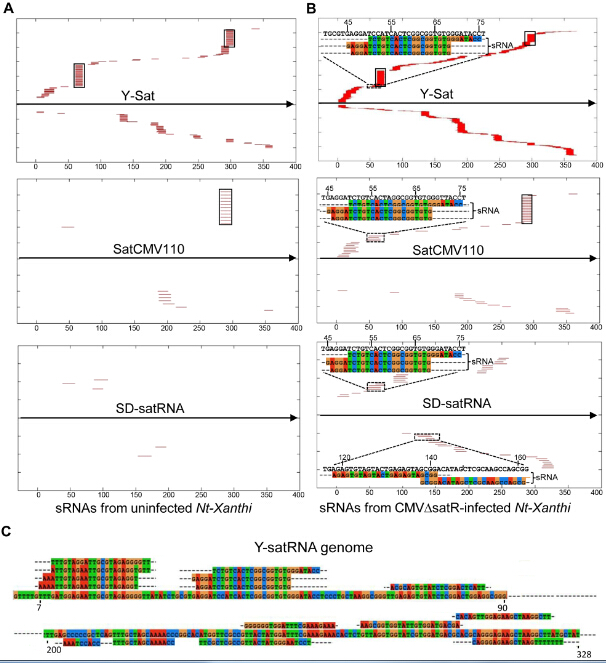Satellite RNAs (satRNAs) are small noncoding subviral RNA pathogens in plants that depend on helper viruses for replication and spread. While much is known about the replication and pathogenicity of satRNAs, their origin remains a mystery. A previous study has reported de novo emergence of Cucumber mosaic virus (CMV) satRNAs on serial passaging plants with CMV helper virus infection. Two main origins of satRNA have been suggested, the genome of the helper virus or that of the host plant.
To explore the origin of CMV satRNA, Prof. GUO Huishan’s group cooperated with Dr Ming-Bo Wang from CSIRO Plant Industry, Australia, and constructed a fusion transgene containing the CMV satRNA sequence, and found that only the CMV SatRNA sequence region was methylated in Nicotiana tabacum plants, indicating that the satRNA sequence is subject to 24-nt small RNA (sRNA)-directed DNA methylation. 24-nt sRNAs as well as multiple genomic DNA fragments, with sequence homology to satRNA, were detected in Nicotiana plants, suggesting that the Nicotiana genome contains satRNA-like repetitiveDNA sequences.
Bioinformatic analysis of sRNA libraries from CMV-infected and wild type Nicotiana plants showed that the number of matching sRNAs was generally increased in the CMV-infected sample compared to the wild type sample, and the majority of them likely derived from highly repetitive region. Some satRNAs matching small interfering RNA (siRNA) sequences aligned with several regions of the satRNA genome, suggesting the possible existence of long stretches of satRNA-like sequences in the Nicotiana genome.
Their results point to a host genome origin for CMV satRNAs, and suggest novel approach of using small RNA sequences for finding the origin of other satRNAs.
The work was supported by grants from National Program on Key Basic Research Project of China and the Natural Science Foundation of China. The results were published in PLoS Genetics (http://journals.plos.org/plosgenetics/article?id=10.1371/journal.pgen.1004906).

Alignment of sRNAs to three CMV satRNA genome sequences,
(A)sRNAsfromuninfected N. tabacum plants. (B)sRNAs from CMV-infected N. tabacum plants.(C)the 14 sRNAs identified from CMV-infectedplants that map to the Y-SatRNA.(Image by Prof. GUO’s group)
